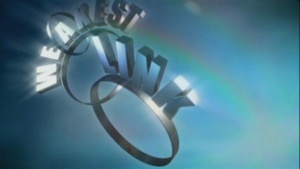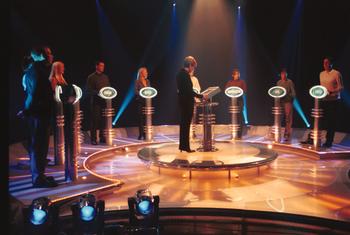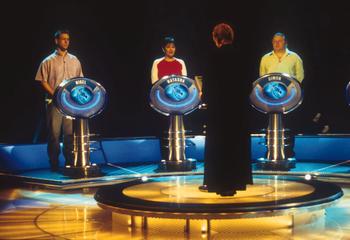Weakest Link
(→Web links) |
(→Champions League) |
||
| Line 119: | Line 119: | ||
Having said all that, Anne does seem to have softened up somewhat. In the early shows, she was in full-on "cold" mode the whole time, practically snarling instead of speaking and not even cracking the steely facade for the goodbye to camera at the end. After a while, she started to crack a smile every now and then. These days, she's smiling and even laughing between rounds, and the ritual insults have turned into two-way banter. The show these days is feeling almost ''friendly''. That can't be right, surely? | Having said all that, Anne does seem to have softened up somewhat. In the early shows, she was in full-on "cold" mode the whole time, practically snarling instead of speaking and not even cracking the steely facade for the goodbye to camera at the end. After a while, she started to crack a smile every now and then. These days, she's smiling and even laughing between rounds, and the ritual insults have turned into two-way banter. The show these days is feeling almost ''friendly''. That can't be right, surely? | ||
| - | === Champions League === | + | === Champions League and Special Episodes === |
The compulsive nature of the show meant that the BBC began promoting it for some shows on BBC1 in a prime time slot. ''The Weakest Link: Champion's League'' was born with slight changes to the format. First, bigger studio and more importantly a studio audience. Opinion is divided as to whether this is a good thing or not, it loses the claustrophobic atmosphere of the daily afternoon show but it does feel more like a Coliseum and as such the insults become that little bit more humiliating. It is only television however, and on the other hand it gives both Anne and the contestants the opportunity to play up to the audience, which means they can play it more for laughs. The feeling is that the audience are laughing at least as much with the contestants as at them. | The compulsive nature of the show meant that the BBC began promoting it for some shows on BBC1 in a prime time slot. ''The Weakest Link: Champion's League'' was born with slight changes to the format. First, bigger studio and more importantly a studio audience. Opinion is divided as to whether this is a good thing or not, it loses the claustrophobic atmosphere of the daily afternoon show but it does feel more like a Coliseum and as such the insults become that little bit more humiliating. It is only television however, and on the other hand it gives both Anne and the contestants the opportunity to play up to the audience, which means they can play it more for laughs. The feeling is that the audience are laughing at least as much with the contestants as at them. | ||
| Line 133: | Line 133: | ||
<div class="image">[[Image:Jon_briggs_headshot_small.jpg]]''Jon Briggs, the sadly unseen beauty to Anne's beast''</div> | <div class="image">[[Image:Jon_briggs_headshot_small.jpg]]''Jon Briggs, the sadly unseen beauty to Anne's beast''</div> | ||
| - | The Beeb also showed some of Anne's | + | The Beeb also showed some of Anne's episodes from the American version of the show, which was practically the same as the British version except that they had an American voiceover artist who sounded half-asleep and made us appreciate just how much Jon Briggs' contributions bring to the British show. His role may involve little more than recycling the same dozen or so phrases again and again, but it's just not the same without him. One notable difference in the American version was how much more feisty the contestants generally were in their banter with Anne. Apparently, many swear-words in their responses, both to her and after being voted off, had to be edited out! |
There's a risk that the Beeb are now going to overdose on "nasty" shows which may pale in comparison to this original. In the meantime, though, the BBC can enjoy having their first big hit of the decade. | There's a risk that the Beeb are now going to overdose on "nasty" shows which may pale in comparison to this original. In the meantime, though, the BBC can enjoy having their first big hit of the decade. | ||
Revision as of 20:49, 6 April 2024
Contents |
Host
Anne Robinson (2000-12, 2017 special)
Romesh Ranganathan (2021-)
Co-hosts
Voiceover:
Jon Briggs (2000-12, 2017 special)
Terry Wogan (2004 Eurovision special)
Marcus Bentley (2007 Big Brother special)
Julie Hesmondhalgh (2021-)
Broadcast
Daytime editions: BBC Two, 14 August 2000 to 8 February 2008
BBC One, 11 February 2008 to 16 June 2011
BBC Two, 5 September 2011 to 30 March 2012
Primetime and celebrity editions: BBC One, 31 October 2000 to 31 March 2012
BBC Studios and Goodbye Television for BBC Two, 17 November 2017
BBC One, 18 December 2021 to present
Synopsis
Anne Robinson does the BBC consumer programme Watchdog, billed as "the programme you cannot afford to miss." Funnily enough, this could be "the programme where you cannot afford to miss." Oh-ho!
If you were to describe the show in terms of other shows, it would be Fifteen-to-One crossed with Big Brother. Rather than getting William G. Stewart, Davina McCall and Anne Robinson in a house to see what would happen under the pretence of socialite experiment, this goes the way of a quiz where the contestants vote each other out until the last person left wins all the cash that they'd accumulated as a team.
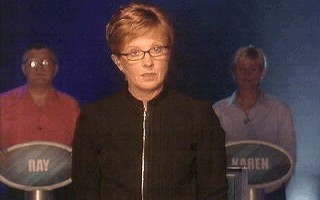 Aaaargh! Don't look into her eyes!
Aaaargh! Don't look into her eyes!Psychological counselling may or may not be on hand for losing contestants. And blimey, they might need it because hosting the show is Anne Robinson in ultra-stern mode, but more of that in a moment. (Behind the scenes rumours have reported there have indeed been a few bruised egos during production.)
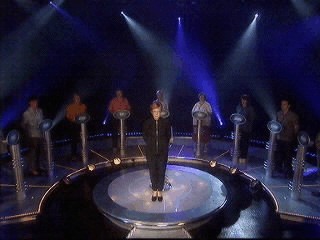 Hmm... isn't this 9/15ths of the Fifteen to One set?
Hmm... isn't this 9/15ths of the Fifteen to One set?The rules then. In the beginning there are nine people and a possible £10,000 up for grabs - and when this show started in the pre-Deal or No Deal days, that was quite a lot of money for a daily game show, and still for a BBC daily game show. (Coincidentally, DOND premiered exactly five years to the day the primetime Link started.) Questions are fired off to people one at a time over a time limit which starts at 3 minutes and gets 10 seconds lower after each round. For each correct answer they get a 'link' in the 'chain' which begins at nothing and gradually goes up towards a thousand pounds through nine links, the values between each link getting higher each time. There is a thousand pounds maximum to be won in each round.
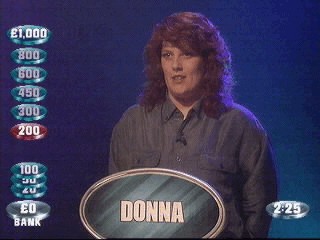 They've got £100 at stake... for now
They've got £100 at stake... for nowIf someone gets a question wrong then the chain is broken and they've got to start again from the bottom. At any time before a question is asked of someone they can say "Bank" to safeguard the cash they've got, but then the chain is reset to £0. This means they can amass their £1000 by several smaller chains, but this requires more correct answers (e.g. five chains of four answers in a row = 20 correct answers, instead of 9). It should be noted that even if everybody in Round One - or, less likely, any other round - gets their question right straight off, the thousand pounds on offer for that round still isn't safe until someone says "bank". Failure to bank at the right moment - or even worse, answering a question wrongly and thus losing the lot - is a surefire way to an early exit from the game.
At the end of every round each person votes out who they think is The Weakest Link - in the chain, do you see? - by writing the names of another contestant on the bits of metal in front of them (with pens that don't seem to write very well, it would seem). Whilst this is going on, Voiceover Man says something along the lines of "The statistics show that the strongest link for this round was Simon who got all his questions correct and banked £600. The weakest link was Nigel who not only got all his questions wrong but is also wearing pink underpants. Of course only the contestants can decide."
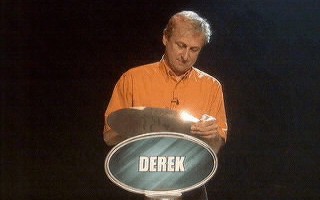 Derek decides on his weakest link
Derek decides on his weakest linkWe then see everybody's decision. Anne will ask why they picked such and such. The point of this is somewhat dubious, because nearly always they'll say "because they answered their questions wrongly". Anne will sometimes come back with "But you were rubbish also, weren't you? Come on then, outside. Now." After all the verbal fisticuffs, the contestant attracting the most votes from their peers will get a curt "goodbye" from Anne and have to walk off the set.
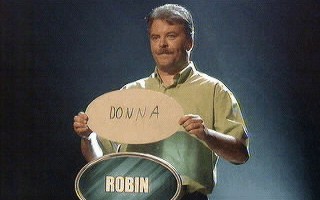 A contestant places his kebab order for after the show.
A contestant places his kebab order for after the show.Now, the set is fairly nice, but it's also quite clumsy. It would have been better if there were some doors at the back where eliminated contestants could walk out. As it is, they have to step very carefully around the semicircle to walk off. It's not very elegant. And they're using those lights yet again? Did David Young buy a job lot or something?
Furthermore, if there are equal votes then the strongest link (the person getting the most questions correct) gets the casting vote. Now, they can change this from the person they actually put down - but usually there's no real reason why they would ever want to, so why ask?
There's a quick post-game interview with the losing contestant (usually with things like "I hope Natalie dies a long, painful death. And I think that Nigel will be out next round.").
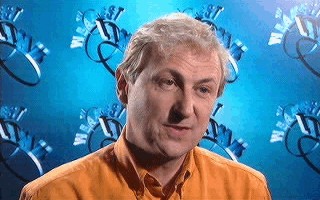 Do you like my new wallpaper?
Do you like my new wallpaper?Continue until only two people remain. Yes, that's seven rounds that are nearly identical. There's then a kind of a bonus round where the two finalists work together for a 90-second round and the winnings are trebled (quick! call Action Time!).
Once Anne has told them how rubbish they were for a final time, they decide who wins the pot by virtue of a quiz in the style of a penalty shootout competition. Originally it looked like the batteries in the Anne Robinson robot started leaking voltage at this point as the gaps between her phrases got longer and longer in what could be described at best as a way of increasing attention and at worst as a way of being incredibly annoying: "What colour is... the... character... of Colonel... Mustard... represented by in the... game... C... l... u... e... d... o?". She's now stopped doing this, so someone out there must have plucked up the courage to recharge them.
In the final, each player had to step forward to the single podium to receive the questions which was actually quite annoying and looked very A-Level Theatre Studies. (This didn't last long, thankfully, and now they stay at their own podiums which works much better.) The winner gets all the money won over all the rounds. The loser wins nothing.
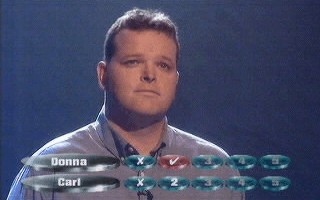 Donna and Carl re-enact the penalty shootout of Euro 96
Donna and Carl re-enact the penalty shootout of Euro 96So, does the whole package fit together as well as Millionaire? If we're being honest, not really, because there's a rather long list of (admittedly minor) niggles on our mind. Allow us to brain dump.
Firstly, the title of the show sometimes doesn't deliver on its promise. Clever and tactical voting often dictates that people vote out a stronger player so they have a bigger chance of winning at the end. So then, neither is this show the Weakest Link or the strongest link but rather the link that was at least six and a half times as good as the weakest link, but only about two thirds as strong as the strongest link. The tendency for stronger players to be voted off towards the end has become so much a feature of the show that Anne now emphasises that players should vote off the weakest link at the final vote. And day in, day out, they ignore her and vote off the strongest link regardless.
Next is the promise that there's £10,000 at stake. Yeah, well there is theoretically, but they rarely pay out anything approaching that. And with Deal or No Deal regularly giving away much more, it's looking a little dated. But, to be fair, it's still possibly the highest dosh-attracting show on daytime BBC TV, which is to be welcomed (by the time this show hit the air, did anyone still get excited by the £2,000 doled out by Wheel of Fortune?).
The questions are clever in that they are all pitched in such a way that you think you should know them and yet you manage to get the wrong answer (such as "What is the smallest planet in the Solar System - Mercury or Pluto?"... though that's changed now anyway, what with Pluto getting booted out of the club by the International Astromafia). A few are uneven in difficulty, with some contestants being asked daisy-cutters such as "What is a quid?" (like... duuuuh) which makes those contestants look better than they really are. Partly this is because of the sheer volume of questions required - about a thousand each week by our reckoning. Even allowing for that, there do seem to be a few too many questions along the lines of "Where do penguins live in the wild - the Antarctic, or South Kensington?".
The chain of values motif is clever, but the ramped values don't seem steep enough. Would you rather have £450 guaranteed or the chance of getting £600? Millionaire works because the double-or-nothing ramp is very steep, so even £250,000 winners are still tempted to at least consider the next question.
That said, there are some subtleties in the scoring. Players need to decide for themselves whether they should bank the cash and be seen as a team player or hold their nerve and win cash a lot quicker but risk incurring the wrath of the whole team when they lose the £200 or whatever that has been built up. It's still a bit dull when they insist on banking every other question though. Mistakes are magnified as the rounds go on as the questions come round a lot faster and players being tested a lot more - it's no wonder that in the post-game interview a lot of the players say that that was the hardest thing they'd ever done and with weak links going round by round there is always the added pressure of expectation of doing well.
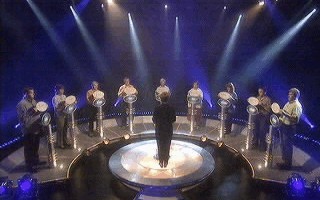 The Weakest Link set. Anne's lectern swivels to face each contestant in turn.
The Weakest Link set. Anne's lectern swivels to face each contestant in turn.But the really, really bizarre thing about this show is Anne Robinson's no-nonsense attitude. We half expect her to take out a gun and shoot the losers (now there's an idea for a show! [Or for a Doctor Who plotline - we are getting paid for that idea, right? - Ed.]). The ultra-serious approach is certainly an interesting experiment, and credit to them for trying, though subsequent copycat 'nasty host' shows were a bit embarrassing really - King of the Castle, anyone?
With Anne having an attitude like "You have banked £20. You could have won £1000. That's pathetic." you as a viewer feel bad. Don't get us wrong - this kind of negative entertainment can be a perfectly valid objective for a TV show, but it does take a lot of getting used to. That said, once you've got over the first couple of episodes she becomes really entertaining and she's only saying out loud what we're actually thinking at home.
Take this for example. Let's imagine a show called "The Nicest Link" hosted by Les Dennis or somebody. Instead of "Well in that round team you banked a pathetic £50," we'll have "well team, in that round you banked £50, well done!" Instead of "You work for an insurance company, how come you didn't know what 25% of 400 was?" it would be "well, it looks like you got a question wrong." Instead of "Julia, in fact you were FAR worse than any other player in that round but it's votes that count and with four votes Bob, you ARE the Weakest Link - goodbye," we'd instead get "well Bob, I'm afraid you've been voted off. Have you had a good day? Excellent. Let's give him a round of applause!"
Let's be honest, it's not as good is it? It's true that this show is a lot less so much about winning as not losing, and we know that's unpopular in some circles, but the fact is that the show is actually pretty compelling once the initial culture shock has worn off.
Having said all that, Anne does seem to have softened up somewhat. In the early shows, she was in full-on "cold" mode the whole time, practically snarling instead of speaking and not even cracking the steely facade for the goodbye to camera at the end. After a while, she started to crack a smile every now and then. These days, she's smiling and even laughing between rounds, and the ritual insults have turned into two-way banter. The show these days is feeling almost friendly. That can't be right, surely?
Champions League and Special Episodes
The compulsive nature of the show meant that the BBC began promoting it for some shows on BBC1 in a prime time slot. The Weakest Link: Champion's League was born with slight changes to the format. First, bigger studio and more importantly a studio audience. Opinion is divided as to whether this is a good thing or not, it loses the claustrophobic atmosphere of the daily afternoon show but it does feel more like a Coliseum and as such the insults become that little bit more humiliating. It is only television however, and on the other hand it gives both Anne and the contestants the opportunity to play up to the audience, which means they can play it more for laughs. The feeling is that the audience are laughing at least as much with the contestants as at them.
Secondly, the first version was played with eight champions from the afternoon daily show. This was genius because theoretically the team should have done better this time because they'd already proven themselves but no, champions were liable to making lots of mistakes too, magnified by the harsh but fair tongue of Anne Robinson.
Thirdly, and this has been complained about by other channels because it's paid out from the licence fee, the prize money has been bumped up. There's now £5,000 up for grabs each round, that's a total of £50,000 up for grabs (this is an improvement from when the primetime specials first started- £2,500 was up for grabs each round, eight players started the game instead of nine, and the money was only doubled for the final round, which produced a total of £20,000)
It's hardly Millionaire but perversely, even though the prize money is the main "thing" of the show, it's also the least important thing about the show. Oh, and the cards have been replaced with whizzy electronic pencils.
But that's not all! Since then we've had even more, including a Bad Losers Special, a Eurovision Song Contest Special, even a (yes) Drag Queen Special and a "Puppets Special". In fact, the specials have outlived the "regular" primetime version, with all manner of celebrity editions being flung out at Saturday teatimes.
The Beeb also showed some of Anne's episodes from the American version of the show, which was practically the same as the British version except that they had an American voiceover artist who sounded half-asleep and made us appreciate just how much Jon Briggs' contributions bring to the British show. His role may involve little more than recycling the same dozen or so phrases again and again, but it's just not the same without him. One notable difference in the American version was how much more feisty the contestants generally were in their banter with Anne. Apparently, many swear-words in their responses, both to her and after being voted off, had to be edited out!
There's a risk that the Beeb are now going to overdose on "nasty" shows which may pale in comparison to this original. In the meantime, though, the BBC can enjoy having their first big hit of the decade.
By 2008, long after all of the feeble imitations had been deemed too rubbish to show on UKTV Obscure, The Weakest Link was still going strong on BBC2. After 1100 daytime episodes, and more than 100 prime-time and celebrity episodes, it was as much of a television fixture as Neighbours. There was no great surprise when the BBC1 controller poached Link after her Australian soap opera vanished to Channel 5. The only raised eyebrows came when the entire children's schedule was shunted back by 20 minutes, rather than chop Link down to a half-hour game.
In April 2011 it was announced that Anne Robinson was quitting the show to devote more time to writing, and the BBC had decided not to replace her, meaning the show went off air in the spring of 2012 for a few years. A Children in Need episode in 2017 showed a clear need to replace the host.
A new run began in December 2021 with Romesh Ranganathan in charge. The tone was markedly different: Romesh is less nasty than his predecessor, and actually (gasp!) praises good rounds. The editions, all involving celebrities, were mostly put out in the traditional Saturday teatime slot, but a few aired in the fallow week between Christmas and New Year.
Key moments
Contestants getting very easy questions wrong, maybe it's because of the eyes of Anne Robinson that distracts their brains.
Catchphrases
Anne Robinson:
"You are the Weakest Link... Goodbye"
"Let's play 'The Weakest Link'!"
"Start the clock!"
"That money will go through to the next round - but one of you will not!"
"You won [less than £1,000], but you know you had a chain of [nine or more] correct answers. Who kept banking?"
"It's time to vote off the weakest link!" or, occasionally: "Have the courage to vote off the weakest link!"
"Voting over - it's time to reveal who you think is the weakest link!"
Especially in the early rounds, lots of contrived analogies for the state of being the weakest link, such as "Whose village is missing its idiot?", "Who is the first cuckoo of spring?", "Who needs rebooting and who needs booting out?" and "Whose knowledge never went to college?" As well as countless others.
To the winner: "That means, (whoever), you are today's strongest link and you go away with (x amount)", then, to the defeated finalist: "(Whoever), you leave with nothing!" In the celebrity editions, Anne would sometimes tell the winner that they would go away with the prize money and then tell the losing finalist, "You will just go away."
(At the end of the show): "Join us again on 'The Weakest Link' - goodbye!" - complete with the trademark wink! In early episodes, Anne used to simply say, "You have been watching 'The Weakest Link' - goodbye!" with no smile, wink or anything!
When only 4 contestants are left, Anne usually comes out with some speculation regarding whether they will survive or not, based on their names and/or jobs. Three memorable examples relating to names were: "Is Charlton no longer athletic?" "Should Dusty be binned?" and "....Or are things looking iffy for Aoife?" and two relating to jobs were: "Should Richard (a vet) be put down?" and "Do you want to draw a line under Matt (a white-liner)?". The various insults Anne throws at the contestants are called "slams" by the production team.
Jon Briggs:
"...but will the team notice this?"
"Whose game is over?"
Inventor
Devised by Fintan Coyle and Cathy Dunning
Theme music
Composed by Paul Farrer, though credited in the earliest episodes to his publishing company, Inter Angel Music. Interviewed in the Daily Mail in November 2007, Farrer revealed it nets him £980 in royalties per episode... and that's just for the UK version!
Trivia
Rejected working titles include The Missing Link and Money Chain.
In her autobiography Memoirs of an Unfit Mother, Anne Robinson provides extracts from the original fax she received offering her the role of host for The Weakest Link. This was the original concept:
- "At the beginning of the week we start off with 11 contestants who are all total strangers. They have to work as a team over the course of ten rounds to win a holiday by the end of the week. Every round they successfully complete represents a day's holiday, so in theory they can win up to 10 days abroad. However, only one of them will actually go on the holiday because after every round the contestants will have to vote off the person they consider to be the weakest link until it's finally whittled down to one."
The highest prize ever won on the civilian daytime version was £5,420. The lowest was £750. The penultimate episode, a Quiz Champions edition in 2012, played to the regular rules and raised £7,750.
Basil Brush (yes, a puppet!) managed to win the 2005 pantomime special.
There was also a "Puppets Special" just after Christmas 2007, featuring such puppets as Zippy and George from "Rainbow", Roland Rat (who had also previously appeared in a 2003 "Children's Television Presenters Special"), Soo from "The Sooty Show", Nobby The Sheep, Otis The Aardvark and Nev. (There was even a puppet version of Anne in the opening and closing sequences!) The final was between Roland and Soo and Soo was the winner, with the prize money going to her nominated charity, the WWF (to help her fellow pandas!) The puppets managed to throw plenty of insults at Anne, while she, at one point, zipped Zippy's mouth up in order to allow George to speak - and she even kissed Nev!
The show celebrated its 1,000th daytime episode on 18 December 2006 with a special episode featuring past contestants. This was followed by a documentary.
The Weakest Link was one of a number of programmes to move out of London, as part of a BBC project to give its regional staff experience in making network programmes. From 2009, episodes were filmed at the BBC's new studios at Pacific Quay, Glasgow.
The prize structure in each round of the daytime show - from £20 to 50, 100, 200, 300, 450, 600, 800 and £1000 - remained unchanged throughout the programme's run. From 2003, most of the celebrity editions on BBC1 offered a potential £20,000, simply doubling these values.
Reaching this stability was a journey in itself. In the early part of the decade, BBC1's schedule was in a state of flux, and two variants of Weakest Link were developed for various timeslots. The Champions' League editions, and a number of episodes commissioned for prime-time in 2000 and 2001, had eight players and ran for 40 minutes. There was a potential £20,000 in the show, and prizes of £50, 100, 200, 500, 1000, 1500, 2000, and a target of £2500 per round. Winnings in the final round were doubled.
About twenty shows were made with just seven contestants, fitting a 35-minute hole in various parts of BBC1's schedule. Again, the jackpot was £20,000, with each round progressing £50, 100, 250, 500, 1000, 1750, to the target of £2500. As in the daytime show, the final round was for treble money. These variations didn't stick, and BBC1 viewers were eventually allowed nine celebrities who can and would banter with the host. One more seven contestant edition was made for Children in Need in 2017.
Following news of the programme's pending demise, it returned to BBC Two from 4 July 2011, immediately after the Wimbledon break. Initially, it made a direct swap with Pointless at 4.30pm, but drifted backwards through the afternoon schedules, the final episodes aired at 2.15.
Romesh's take on the format also had eight contestants. The money ladders are a bit confusing, so pay attention; ladders use eight consecutive values from 50-100-250-500-750-1000-1500-2500-5000-7500-10000. Rounds 1 and 2 start at £50 to a target of £2500, rounds 3 and 4 go from £100 to aim at £5000. Rounds 5 and 6 begin at £250 with a target of £7500. The final round moves from £500 to £10,000 - but it's doubled, so is effectively 1000-1500-2000-3000-5000-10000-15000-20000. And from series 3, the £7500 chain was revised to read 7500-5000-3000-2000-1500-1000-500-250. Whew!
For absolutely no reason at all, a week of episodes broadcast in the last week of December 2022 contained trailers for their next episodes. One of these episodes, a Eurovision special, was repeated at 3:45 on 13 May 2023 (the day Liverpool's Eurovision Song Contest aired); they didn't bother extricating the trailer, which meant viewers who didn't know they were watching a repeat would have wondered what the BBC were on about.
Merchandise
Weakest Link computer game PC version
Weakest Link computer game Playstation version
Weakest Link computer game Playstation 2 version
The Weakest Link Quiz Book Book
The Weakest Link Quiz Book 2 Book
The Weakest Link Quiz Book Bumper Edition Book
Weakest Link - the single Music CD - NB. This is not the theme music, but a dance track that samples the four-note sting and various phrases from Anne and Jon.
You are the Weakest Link, Goodbye - Book (for children)
Web links
Opening titles from the BBC Motion Graphics Archive
See also
Weaver's Week retrospective, the BBC's 2017 and 2021 revivals, and a 2020 revival on NBC.

